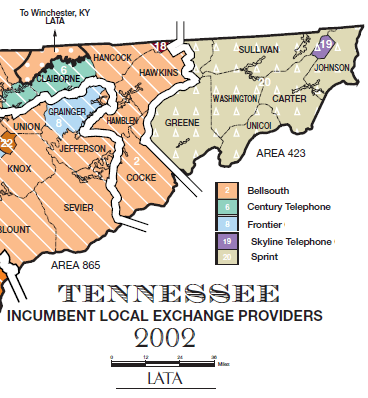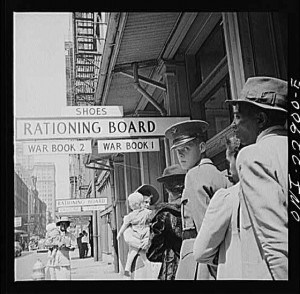Obtaining broadband in rural America can be a real challenge, but few rise to the occasion more than Stop the Cap! reader Paul, who lives in Blaine, Tenn. Paul so wanted broadband service, he was willing to pay for his own telephone poles and equipment to get Frontier Communications to provide him with DSL service, even though he technically lives in AT&T territory.
Paul’s saga, documented on his blog, began in 2009, when his satellite fraudband provider Optistreams could no longer manage reliable uploading of images and maps for his employer, despite the fact he was paying nearly $150 a month for the service. Satellite providers are having a tough time providing customers access to an increasingly multimedia rich Internet. With low usage caps and ridiculously low speeds, most satellite customers we’ve heard from report their experiences to be frustrating, at best. For Paul, in rural Grainger County, it had become intolerable. Verizon, the best possible wireless option, delivered one bar to the farm country Paul lives in — unsuitable for wireless data service.
Paul called his local phone company, AT&T, and inquired about when the company would extend its DSL service to his part of Blaine.
AT&T answered Paul succinctly: “[We will] never provide DSL within 20 miles of your location.”
Paul’s property is situated right on the boundary between AT&T and Frontier Communications’ service areas. AT&T provides service at Paul’s home, but Frontier Communications’ territory starts just 1,400 feet away, on the other end of his property. In-between is a telecommunications no-man’s land.
Paul pondered emigrating his service from the Republic of AT&T to the Fiefdom of Frontier, which does offer DSL nearby.

Paul lives in Grainger County -- a Frontier Communications territory surrounded by the former BellSouth, today owned by AT&T.
AT&T told Paul he could leave them anytime he liked, taking his broadband business to Frontier. Besides, nothing precluded him from doing that with or without AT&T’s consent, informed AT&T’s Eastern District Counsel.
Declaring allegiance to Frontier would be no easy matter, however. Would Frontier allow him to settle down as their broadband customer?
“After a bunch of arguing with Frontier District Manager Mike Bird he sent District Engineer John Simpson out to my home,” Paul says. “Simpson informed me that I was in AT&T territory and that ended all conversations. I stated that AT&T had advised they had no problem and further there was no government regulation. Didn’t matter I was told, that was that.”
Few, if any phone companies will agree to trespass on another provider’s turf, except under the most special circumstances.
Paul contacted Sen. Bob Corker (R-Tenn.) to escalate the matter, and followed up with an official complaint to the Federal Communications Commission.
Federal agencies like the FCC become particularly responsive when a United States Senator is involved in monitoring the dispute. AT&T responded to the complaint telling the Commission Paul had effectively fled their service area and was now a customer of Frontier Communications. Frontier ignored the FCC initially, and instead sent Paul a letter affirming they would be willing to provide him with DSL, but at a “go away” installation price of $10,000.
When providers confront unprofitable customers difficult to serve, it is often easier to give them a sky high installation price with the hope it will discourage them from pursuing the matter. Frontier claimed the costs of running infrastructure to reach Paul would amount to $9,977.44 — check or money order, please.
From Gregg Sayre, Frontier’s Eastern Region Associate General Counsel:
“As you know, you are in the service territory of AT&T. AT&T is correct that we legally can provide service to you outside of our local service territory. Unfortunately, the cost of serving you… if fully absorbed by Frontier, would overshadow the potential profits. …In this case it does not make economic sense for us to undertake a line extension at our expense into AT&T’s service territory to reach your location, and the law does not require us to do so.”
“I countered with the fact that we would run the poles along the roadway and they could pay our pole attachment agreement. They balked,” Paul writes. “We, in turn, stated we would bring our own infrastructure to them underground and across a friend’s farm and did such for a quarter of the price. This included running our own network interface at their pole and our house.”
In the end, Paul paid out of pocket for 1,600 feet of direct burial cable running across two farms and a county road. He assumes responsibility of his cable, Frontier is responsible for the network from their pole back to the central office.
After the robust investment in time, money, and energy, what Paul ended up with wasn’t worth a dollar:
That’s worse than most satellite providers.
In fact, Paul has documented much of the time he is without any service at all — offline at least 38 of the last 50 days.
 “Our average speed until they installed a new D-SLAM was 92kbps down and 125kbps up,” Paul writes. It wasn’t just a problem for him. Among Frontier’s loyal subjects already a part of their service area, customers also reported similar slow speeds. Paul organized a door-to-door campaign to bring a united front of complaints to company officials.
“Our average speed until they installed a new D-SLAM was 92kbps down and 125kbps up,” Paul writes. It wasn’t just a problem for him. Among Frontier’s loyal subjects already a part of their service area, customers also reported similar slow speeds. Paul organized a door-to-door campaign to bring a united front of complaints to company officials.
Paul notes the local Frontier technicians have been responsive and understanding, but Frontier officials higher up are simply dragging their feet on needed upgrades. Finally, $200 in service credits later, Frontier is promising to install a fiber cable to reduce the distance between the central office and the more distant points in the exchange where Paul and his neighbors live. While that might help bring Paul’s speeds up, Frontier is notorious for overselling their network, leaving customers in large regions with slow service at peak usage times. This has particularly been a problem in nearby West Virginia.
Paul says Frontier is largely unresponsive to individual complaints.
“I racked up well over 170 repair tickets in six months,” Paul shares. “I organized my rural area and we hammered their call center. Did that do anything? Well, I can’t honestly say it did.”
With Frontier, it takes media exposure and embarrassment or the work of individual employees willing to persistently push higher-ups to authorize real solutions to customer problems, not temporary Band-Aids.
Broadband over a telephone network that is decades old requires substantial investments to function well. In rural areas where customers have few choices, phone companies delivering service on the cheap too often leave paying customers with a quality of service highly lacking.


 Subscribe
Subscribe






